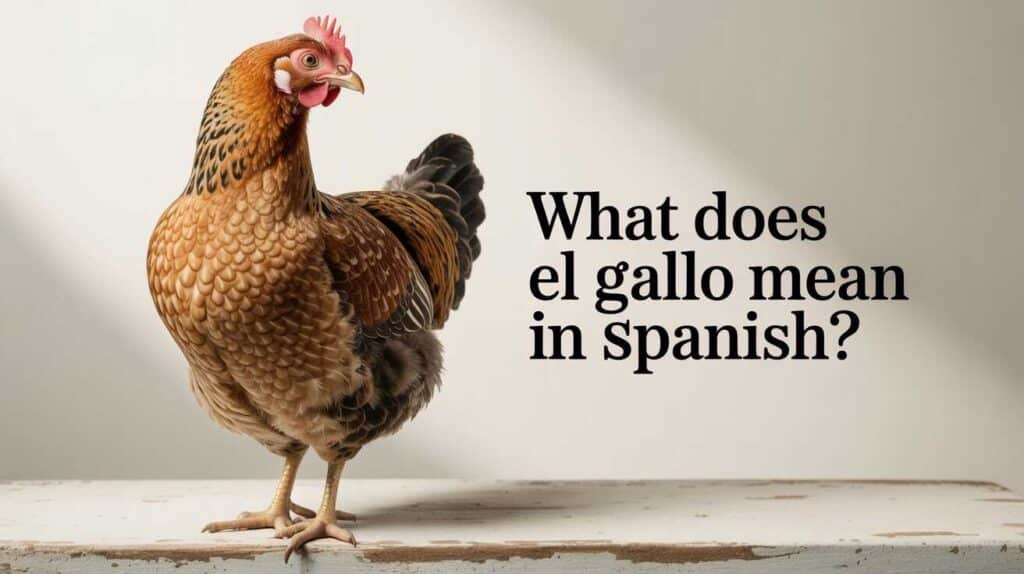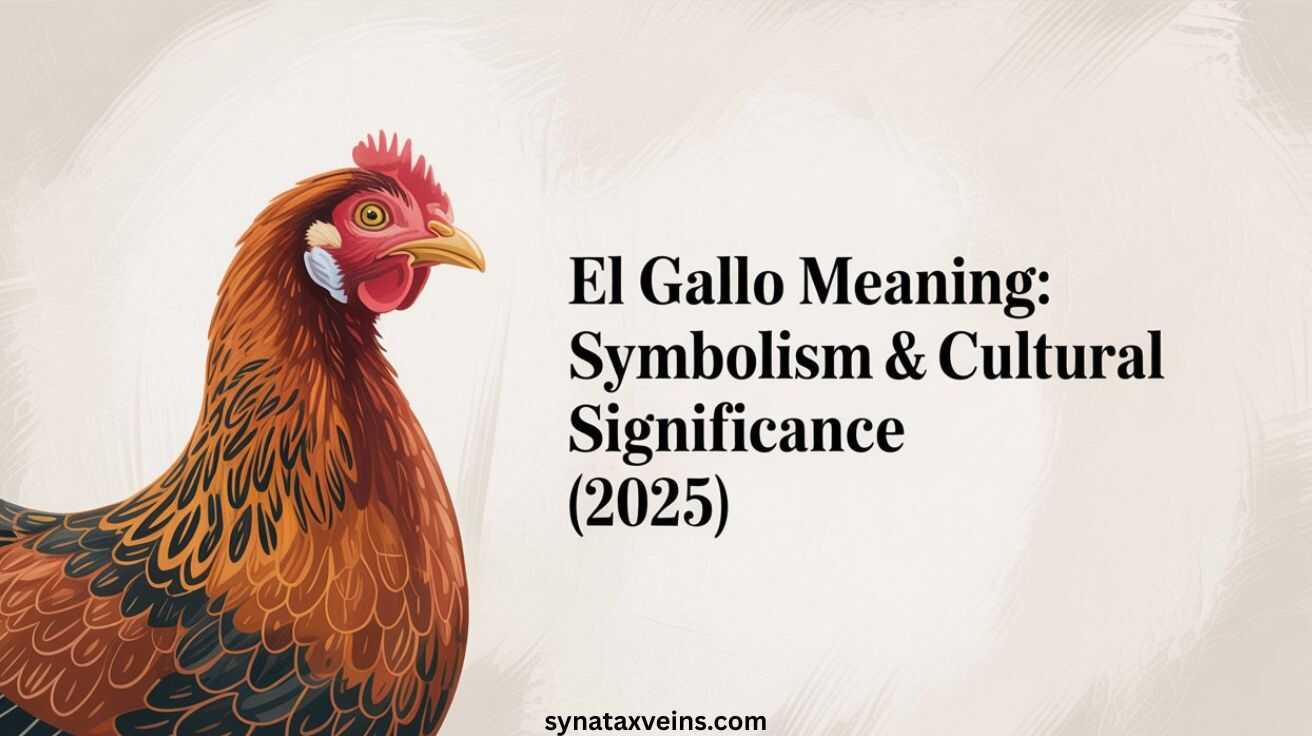When you hear the word el gallo, you might picture a rooster strutting proudly at dawn, crowing to announce the new day. But this bird isn’t just barnyard noise it’s a creature loaded with cultural symbolism, legends, and meaning. Across Hispanic culture and beyond, el gallo meaning stretches from bravery in battle to the flavors of Mexican cuisine. It’s a story of feathers, fire, and faith that has echoed through centuries.
What Does El Gallo Mean?
Literally, el gallo means “the rooster.” Yet in everyday speech, it means so much more. In Latino culture, to call someone un gallo is to recognize their grit, their fight, their unshakable pride. Think of it as calling someone the champion of the ring—the one who never backs down.
That proud crow at sunrise? It’s more than noise. It’s a metaphor for resilience and courage, a reminder that even in darkness, light will break through. This is why the rooster has become a community guardian, a protector figure, and even a symbol of determination and valor across cultures.
El Gallo Meaning in English
In English, el gallo meaning translates simply to “rooster.” But translation alone strips away the layers of story behind it. In English, a rooster might just be a farm animal. In Spanish, it’s a fighter, a symbol of bravery and strength, and sometimes a boastful soul who refuses to be silenced.
The difference lies in cultural relevance. While English uses phrases like “early bird,” Spanish uses gallo symbolism to celebrate resilience and pride. It’s like comparing a spark to a roaring fire both give light, but one has far more heat.
What Does El Gallo Mean in Spanish?

In Spanish culture, el gallo is much more than feathers and a crow. It’s a marker of cultural heritage and a metaphor for toughness. Proverbs use the rooster to teach lessons: pride, persistence, and knowing your place. One popular saying, “cada gallo canta en su gallinero” (every rooster sings in its own barnyard), reminds us that confidence shines brightest on your own turf.
The rooster is also tied to Spanish traditions and Iberian culture, standing as a societal protector loud, confident, and always ready to defend its ground. It’s part of everyday language, stitched into the very rhythm of Hispanic culture.
El Gallo Negro Meaning
Then there’s the mysterious el gallo negro, the black rooster. This darker figure often appears in folklore and spiritual practices. For some, it’s a protector figure warding off evil spirits. For others, it’s a creature of omen, carrying a sense of mystery in spiritual beliefs.
In songs and stories, the black rooster often symbolizes rebellion, survival, and power and bravery in the face of hardship. Within Latino culture, el gallo negro meaning has become shorthand for resilience that borders on defiance a reminder that even in shadow, strength endures.
The Rooster as a Symbol: Courage, Strength & Awakening
From China to Mexico, from Spain to France, the rooster has been admired as a symbol of strength and courage. Its crow at dawn isn’t just a wake-up call it’s a declaration of survival. “I made it through the night, and I’m here to fight again.”
As a universal emblem of bravery and strength, the rooster reflects resilience and courage. In some traditions, it even serves as a village guardian or neighborhood defender. Across international cultural symbolism, this bird is both fighter and herald, tying communities together with its cry.
El Gallo in Folklore & Proverbs
Folklore loves the rooster. In proverbs, it’s the proud leader, sometimes boastful, sometimes wise. In stories, roosters battle one another as metaphors for rivalry or pride. The rooster is not just a barnyard creature it’s a storyteller’s favorite metaphor for ambition, confidence, and survival.
These literary depictions highlight cultural importance, teaching lessons about honor, leadership, and resilience. Through sayings and literary elements, el gallo remains a timeless figure in literary contexts and beyond.
READ MORE >>> Casi Algo Meaning: Discover Its True Meaning and Examples
El Gallo in Popular Culture
El Gallo isn’t just a rooster it’s a cultural symbol that pops up in music, art, literature, and even sports. From traditional Mexican songs to modern brand logos, the rooster often represents pride, courage, and resilience. Its fiery spirit has made “El Gallo” a favorite nickname for famous boxers, singers, and characters in popular media. Whether standing tall on a stage or appearing in everyday slang, the rooster’s image keeps finding new life in pop culture, showing its timeless appeal.
Music and Songs about El Gallo
Roosters sing not only at dawn but also in music. In Latino culture, corridos and rancheras feature the rooster as a voice of strength and courage. Songs like El Gallo de Oro show how gallo culture is woven into rhythm and melody, echoing resilience and courage.
Literature, Film & Art
In novels, paintings, and films, the rooster meaning stretches into rebellion, fight, and cultural symbolism. literary settings, it’s the survivor. In art, it’s dawn’s messenger, crowing out hope.
Mexican Wrestling (Lucha Libre)
Even in Mexican wrestling (lucha libre), the rooster makes its mark. Fighters wear rooster masks and channel the bird’s bravery and strength in the ring. Here, el gallo becomes both performer and protector figure, turning feathers into symbols of pride in popular culture.
El Gallo in Cuisine & Celebrations
In the kitchen, el gallo carries as much weight as it does in story. Within Mexican cuisine, rooster dishes are not everyday meals they’re reserved for special occasions.
Unlike chicken dishes, rooster recipes like gallo en mole or rustic stews have deeper flavors, reflecting the strength of the bird itself. These rooster meals aren’t just food they’re part of Mexican gastronomy, tying families together in festivals and feasts. Through Mexican cooking and Mexican flavors, the rooster becomes a bridge between the table and cultural traditions.
Spiritual & Religious Meaning of El Gallo
In religious rituals, the rooster carries profound meaning. In Christianity, it is forever linked to Peter’s denial of Christ a sound that marked repentance, sorrow, and eventually hope. The crow became a reminder of spiritual awakening in spiritual traditions.
Beyond Christianity, across different spiritual customs, the rooster is viewed as a community protector, a creature that calls out to guard against darkness. Its cry is more than sound it’s a spiritual alarm clock that ties into spiritual beliefs and international cultural symbolism.
El Gallo as a Metaphor
In daily speech, el gallo is a gallo metaphor for the fighter in all of us. Someone who refuses to back down, who protects their family, who carries themselves with pride they are called “a rooster.”
This isn’t just farm talk. It’s a compliment in mainstream culture and literary contexts, a way to recognize fortitude and bravery. It shows how animals can carry cultural importance as community guardians and societal protectors.
Global Perspectives on Rooster Symbolism
Roosters aren’t just Spanish or Mexican symbols they’re universal.
- In Chinese culture, the rooster brings luck, punctuality, and prosperity.
- In France, it’s a proud emblem of the nation, tied to bravery and strength.
- In parts of Africa and Asia, it’s seen as a protector figure, a bird that keeps watch when humans cannot.
This worldwide cock symbolism proves the rooster’s cry transcends borders. Whether it’s rooster symbolism worldwide, international rooster symbolism, or universal rooster meaning, this bird speaks the language of resilience everywhere.
Frequently Asked Questions
What does El Gallo stand for?
El Gallo translates to “the rooster” in English. It stands for qualities like strength and courage, power and bravery, resilience and determination. Across cultures, the rooster often symbolizes a protector figure that guards communities and represents cultural heritage.
Why did Jake Paul call himself El Gallo?
Jake Paul nicknamed himself El Gallo to highlight his bravery, confidence, and fighting spirit inside the boxing ring. The rooster is often linked with fortitude and valor, making it a fitting metaphor for athletes who want to show dominance and pride.
What does gallo mean in Spanish slang?
In Spanish slang, gallo doesn’t just mean “rooster.” It can also refer to:
- Someone who’s confident, bold, or tough.
- A crack in someone’s voice (like when singing or speaking).
- In some contexts, it’s used playfully to mean a show-off or fighter.
What does El Gallo symbolize?
El Gallo symbolizes cultural significance, strength, resilience, and pride. In many traditions, it’s seen as a community guardian, a symbol of bravery and strength, and even linked with spiritual practices and religious rituals worldwide.
Is gallo used in slang?
Yes, gallo is used in slang across Hispanic and Latino culture. Depending on the region, it can mean a brave person, a fighter, or someone standing up with determination and valor.
What does El Blanco mean?
El Blanco translates to “the white one” in Spanish. It can be used literally (to describe something white) or symbolically to represent purity, clarity, or even a nickname in cultural and slang contexts.
Conclusion
The story of el gallo meaning is one of fight, faith, and flavor. From Mexican food to literary depictions, from spiritual practices to popular culture, the rooster is more than just an animal it’s a messenger, a fighter, a community guardian.
Whether it’s the proud crow at dawn, a mask in lucha libre, or a pot of simmering mole, el gallo represents bravery and strength, cultural symbolism, and spiritual beliefs. It crows not just to wake us, but to remind us: every day is a chance to rise again.

Arabella Rose, admin of [synatax veins], makes grammar simple and fun! With expert tips and clear advice, she helps you write with confidence and clarity. ✍️📚

